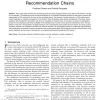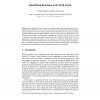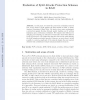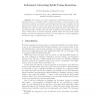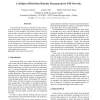132
click to vote
TKDE
2010
15 years 12 days ago
2010
—Peer-to-peer (P2P) networks are vulnerable to peers who cheat, propagate malicious code, leech on the network, or simply do not cooperate. The traditional security techniques de...
INFOCOM
2010
IEEE
15 years 15 days ago
2010
IEEE
—Collaborative applications for co-located mobile users can be severely disrupted by a sybil attack to the point of being unusable. Existing decentralized defences have largely b...
105
click to vote
FC
2008
Springer
15 years 3 months ago
2008
Springer
Sybil attacks have been shown to be unpreventable except under the protection of a vigilant central authority. We use an economic analysis to show quantitatively that some applicat...
113
click to vote
AIMS
2009
Springer
15 years 6 months ago
2009
Springer
In this paper, we assess the protection mechanisms entered into recent clients to fight against the Sybil attack in KAD, a widely deployed Distributed Hash Table. We study three m...
107
click to vote
EUROPKI
2004
Springer
15 years 7 months ago
2004
Springer
Abstract. The Peer-to-Peer Wireless Network Confederation (P2PWNC) is designed to be an open self-organizing Wireless LAN (WLAN) roaming association where users from one WLAN can a...
115
click to vote
WOWMOM
2006
ACM
15 years 8 months ago
2006
ACM
Abstract— A sybil node impersonates other nodes by broadcasting messages with multiple node identifiers (ID). In contrast to existing solutions which are based on sharing encryp...
131
click to vote
SIGCOMM
2006
ACM
15 years 8 months ago
2006
ACM
Peer-to-peer and other decentralized, distributed systems are known to be particularly vulnerable to sybil attacks. In a sybil attack, a malicious user obtains multiple fake ident...
100
click to vote
FC
2007
Springer
15 years 8 months ago
2007
Springer
We propose an economic approach to Sybil attack detection. In our Informant protocol, a detective offers a reward for Sybils to reveal themselves. The detective accepts from one i...
ISCC
2008
IEEE
15 years 8 months ago
2008
IEEE
Structured P2P networks are vulnerable to the sybil attack. In this attack, a misbehaving person generates a huge number of node identifiers and possibly chooses some of them in ...
107
click to vote
P2P
2009
IEEE
15 years 8 months ago
2009
IEEE
Sybil attack is one of the most challenging problems that plague current decentralized Peer-to-Peer systems. In Sybil attack, a single malicious user creates multiple peer identit...
